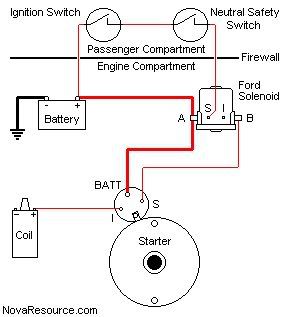Having a heat soak problem with my stock starter, installed a new Powermaster XS high torque starter had the same problem. Has anyone found a starter that will work when hot? Tried a heat blanket that didn't work either.

starter heat soak
jpelli
Discussion starter
123 posts
·
Joined 2004
- Add to quote Only show this user
Having a heat soak problem with my stock starter, installed a new Powermaster XS high torque starter had the same problem. Has anyone found a starter that will work when hot? Tried a heat blanket that didn't work either.
11,400 posts
·
Joined 2002
Add grounds. my headers rest on my stock starter. I added a ground direct from battery to block and from block to the frame. End of problem.
1,423 posts
·
Joined 2005
I don't think a heat blanket would work, would probably make it worse since it seems like it would rather retain all the heat inside instead of keeping it out. I'd try a starter shield and see what happens. Haven't had a heat soaking issue ever since I tried the shield on mine and believe me, the headers run verrryyy close to my starter.
1,430 posts
·
Joined 2004
Boy, I've chased my tail with your problem for a long time. Rebuilt starter, checked and rechecked grounds, new battery, wiring, starter heat shields, and on and on! Finally wired in a remote solenoid and haven't had a problem since. Try it, it's cheaper than what you've tried so far, and may work for you too. Let us know how it goes, and good luck!weirdbeard said:Remote solenoid works every time! no? Thats what I hear.. :drunk:
7,716 posts
·
Joined 2004
Doc here,  imp:
imp:
Here ya go:
![Image]()
If you don't have points, disregard the "I" circuit..
Doc imp:
imp:
Here ya go:

If you don't have points, disregard the "I" circuit..
Doc
82 posts
·
Joined 2005
Don't think any starter will work when the solenoid goes too hot. A hot solenoid means large resistance, and resistance means voltage drop, so the solenoid won't throw out the drive-gear if it don't get the juice...
Some mini-starters can be rotated 180 degree's, so the solenoid comes away from the headers. But, a remote "solenoid" always sends the power needed to throw the starter drive-gear into play, regardless of the original solenoids temperature.
/Pete
Some mini-starters can be rotated 180 degree's, so the solenoid comes away from the headers. But, a remote "solenoid" always sends the power needed to throw the starter drive-gear into play, regardless of the original solenoids temperature.
/Pete
1,039 posts
·
Joined 2004
Copper has a positive temperature coefficient of .393%/°C, which means that a coil that's 1.5Ω at 25°C will be about 2.1Ω at 125°C. This 0.6Ω makes a huge difference in the current through the solenoid coil and its ability to engage the starter, especially when the rest of the circuit is taken into account, like the ignition switch, neutral safety switch and the associated connections and wiring. Applying full battery voltage directly to the solenoid through a low resistence path will greatly increase the chances of the solenoid pulling in.coupe66 said:Don't think any starter will work when the solenoid goes too hot. A hot solenoid means large resistance, and resistance means voltage drop, so the solenoid won't throw out the drive-gear if it don't get the juice...
67 posts
·
Joined 2005
I had this problem on my tow vehicle,wired it as Doc shows never had a problem again,Johnnydocvette said:Doc here,imp:
Here ya go:
![Image]()
If you don't have points, disregard the "I" circuit..
Docimp:
554 posts
·
Joined 2003
Just my $.02
Had the same problem with a stock style starter.
Added Powermaster XS like you said, also added heavier wiring, and problem has never returned.
I would really check out your wiring first before going to the trouble of the alternate solenoid, though it sounds like that would solve it, too.
good luck!
jer.
Had the same problem with a stock style starter.
Added Powermaster XS like you said, also added heavier wiring, and problem has never returned.
I would really check out your wiring first before going to the trouble of the alternate solenoid, though it sounds like that would solve it, too.
good luck!
jer.
716 posts
·
Joined 2003
Since I put the headers on my 2.8 I too had problems with hot starts.
I added a FORD solenoid but wired my a bit different. I have a short jumper from the battery cable to the start pin on the solenoid. I then have the normal wire activate the remote solenoid. The remote solenoid then sends power down to the starter and solenoid simultaneously. I used #2 marine grade cable. I also took the time to make sure the starter was alaigned within specs too.
I added a FORD solenoid but wired my a bit different. I have a short jumper from the battery cable to the start pin on the solenoid. I then have the normal wire activate the remote solenoid. The remote solenoid then sends power down to the starter and solenoid simultaneously. I used #2 marine grade cable. I also took the time to make sure the starter was alaigned within specs too.
1,039 posts
·
Joined 2004
One problem with this way of wiring ( hard wiring the solenoid to the starter wire ) is that a modern permanent magnet starter will generate enough voltage to keep the solenoid energized for a short period of time after you release the ignition switch. This could cause some concern when the starter doesn't release.larryblack said:Since I put the headers on my 2.8 I too had problems with hot starts.
I added a FORD solenoid but wired my a bit different. I have a short jumper from the battery cable to the start pin on the solenoid. I then have the normal wire activate the remote solenoid. The remote solenoid then sends power down to the starter and solenoid simultaneously. I used #2 marine grade cable. I also took the time to make sure the starter was alaigned within specs too.
447 posts
·
Joined 2003
I believe that this is what Larryblack did. I wired my Powermaster starter up like he did and it works great. If the other way works, that's fine. The original basically deletes the voltage loss through the key switch and associated wiring, and this second method just eliminates a few more feet of small wiring.
Attachments
-
33.8 KB Views: 614
12,878 posts
·
Joined 2003
True, but some do it and some don't. I had a Delco mini starter knock off on my 34 that would do just as you described. I replaced it with a high torque Powermaster that does not exhibt that problem.onovakind67 said:One problem with this way of wiring ( hard wiring the solenoid to the starter wire ) is that a modern permanent magnet starter will generate enough voltage to keep the solenoid energized for a short period of time after you release the ignition switch. This could cause some concern when the starter doesn't release.
Vince
716 posts
·
Joined 2003
Generally, the load effect of the bendix dis-engaging makes the motor stop right quick. I have not had a problem. (insert smiley with fingers crossed here)
I did have a problem with it wired like Doc showed. It was better but would still not engaging after 2 or more hours of driving. I would have to wait for it to cool. I am NOT saying how Doc shows will not work. I actually wired the start pin directly with a dash switch and 14 gauge wire.
lust4speed, that is how I did it.
I did have a problem with it wired like Doc showed. It was better but would still not engaging after 2 or more hours of driving. I would have to wait for it to cool. I am NOT saying how Doc shows will not work. I actually wired the start pin directly with a dash switch and 14 gauge wire.
lust4speed, that is how I did it.
-
?
-
?
-
?
-
?
-
?
-
?
-
?
-
?
-
?
-
?
-
?
-
?
-
?
-
?
-
?
-
?
-
?
-
?
-
?
-
?
- posts
- 2.2M
- members
- 183K
- Since
- 2001
A forum community dedicated to hot rod owners and enthusiasts. Come join the discussion about restoration, builds, performance, modifications, classifieds, troubleshooting, maintenance, and more!
Explore Our Forums
Top Contributors this Month
View All
Scott Danforth
157 Replies
BogiesAnnex1
85 Replies
1971BB427
72 Replies




